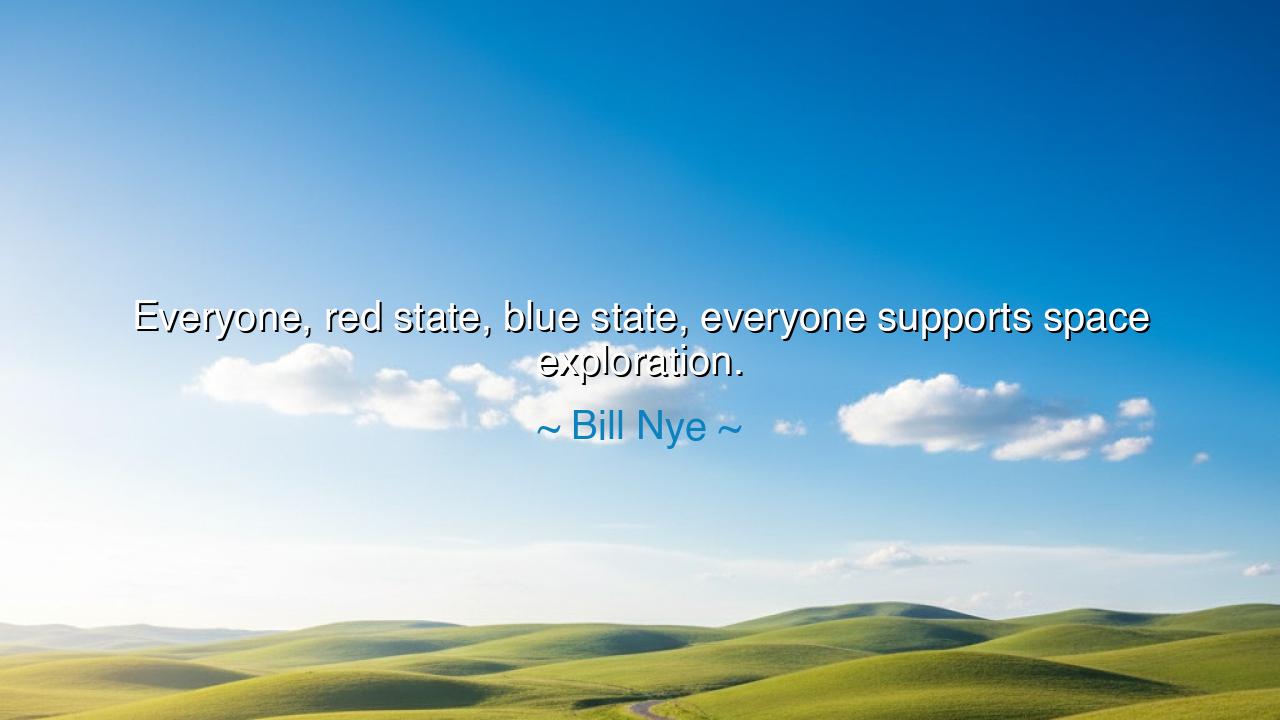
Everyone, red state, blue state, everyone supports space






"Everyone, red state, blue state, everyone supports space exploration." These words by Bill Nye speak to a profound truth that transcends political divisions and highlights the shared human endeavor to explore the unknown. In a world often divided by partisanship, where the lines between red states and blue states seem to define the boundaries of debate, Nye’s statement is a reminder that there are forces greater than our differences—forces that unite us all. Space exploration is one such force. The yearning to understand the universe, to peer beyond the stars and unlock the mysteries of the cosmos, is not confined to any single group, ideology, or nation. It is a universal pursuit, one that calls upon the highest ideals of humanity: curiosity, wonder, and the shared belief in something greater than ourselves.
In the ancient world, the Greeks were among the first to look to the heavens and wonder about the nature of the stars. Aristotle, in his works, sought to understand the cosmos, viewing the heavens as a place of divine order and harmony. While his understanding was limited by the technology of his time, the Greeks laid the foundation for the idea that the heavens were not just a distant, celestial realm but a source of profound meaning for humanity. For the ancient Egyptians, too, the stars were not just points of light in the sky; they were guiding lights that shaped their calendar, determined their agricultural practices, and connected them to a divine order. Space, for them, was not a faraway destination but an integral part of their understanding of the world—a world that united all people under the same sky.
As humanity advanced, the quest to understand the heavens evolved from mythological stories to the birth of science. The Renaissance brought with it a revolution in our understanding of the cosmos, led by the great minds of Galileo and Kepler. They defied the conventional beliefs of their time, using the telescope and mathematics to reveal the true nature of the heavens—placing Earth in its rightful place in the solar system. This moment in history marked the beginning of humanity’s journey toward space exploration, a journey not bound by political borders but by the collective pursuit of knowledge. It is from this moment that the modern idea of exploring the stars began to take shape, uniting thinkers, dreamers, and scientists from all corners of the world.
The space race of the 20th century, culminating in the historic moon landing in 1969, further exemplified this shared human endeavor. The United States and the Soviet Union, ideologically divided during the Cold War, nonetheless shared a common goal: to reach the moon. It was a challenge that transcended politics, a testament to human ingenuity, and a desire to push beyond the limits of our earthly existence. This moment of unity in the face of competition demonstrated that space exploration was not about dividing us but about bringing us together to achieve something greater than any one nation could accomplish alone. In the end, Neil Armstrong’s iconic words, "One small step for man, one giant leap for mankind," reflected not only the triumph of one nation but the triumph of all humankind.
Today, as Bill Nye suggests, space exploration continues to unite us, regardless of political affiliation. The desire to explore the cosmos is not partisan; it is a desire shared by people of all backgrounds, all beliefs, and all nations. Space agencies like NASA, the European Space Agency, and private companies like SpaceX continue to push the boundaries of what we know, collaborating across borders in the quest to understand the universe. Space exploration offers us a vision of unity, a reminder that while we may disagree on many things, we are all citizens of Earth, sharing this fragile planet and looking up to the same stars.
The lesson to take from Nye’s words is that, despite our differences, there are pursuits that unite us all. The quest for knowledge, for understanding our place in the cosmos, is a shared human dream—one that transcends politics, ideologies, and borders. It is a call to see beyond the divisions that often seem so important in our daily lives and to remember the larger picture. The stars are not divided by red or blue; they belong to us all. In the pursuit of space exploration, we find not just technological advancement but also a shared vision of what humanity can achieve when we work together.
In your own life, seek out those things that unite rather than divide. While disagreements and differences are a natural part of human existence, there are also common goals—visions of hope, growth, and progress—that can bring us together. Whether it’s the exploration of space, the pursuit of knowledge, or the simple act of sharing our humanity, there are countless ways we can collaborate and build a better world. As you move through the complexities of life, remember that, just as space exploration transcends politics, so too can our shared humanity rise above the noise of division. Look to the stars as a reminder of the greater unity that is possible when we aim for something far beyond ourselves.






AAdministratorAdministrator
Welcome, honored guests. Please leave a comment, we will respond soon